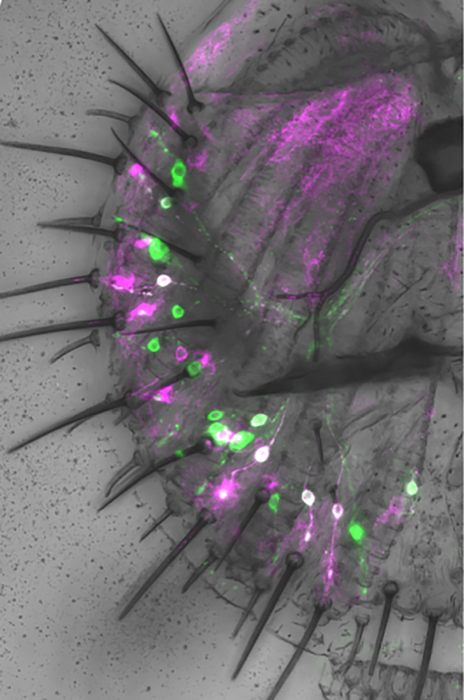Fruit flies are known for their sweet tooth, but new research also indicates they may offer hints to how animals sense—and avoid—high concentrations of salt.

Credit: University of British Columbia
Fruit flies are known for their sweet tooth, but new research also indicates they may offer hints to how animals sense—and avoid—high concentrations of salt.
Using mutant fruit flies, University of British Columbia zoologists have identified a new high-salt receptor on the tongue of Drosophila—receptor IR7c. IR7c governs the insects’ ability to detect dangerously high concentrations of salt, typically over 0.25 moles per litre, or about half as salty as sea water.
“In flies, high salt avoidance is driven by both bitter taste neurons and a separate class of neurons dedicated entirely to detecting high concentrations of salt,” says PhD student Sasha McDowell, lead author of the study published today in Current Biology.
“When we switched off the IR7c receptor, the flies lost their typical physiological responses and behavioral aversion to high concentrations of monovalent salts like simple sodium chloride.”
Flies detect tastes using gustatory receptor neurons located across their body, including the labellum at the very end of their mouths, their pharynx, or throat, and even parts of their legs. In the case of fruit flies, researchers had already identified two co-receptors involved in detecting salt and a variety of other chemicals—IR76b and IR25a—but a salt-specific receptor on the labellum, IR7c, wasn’t known to be involved.
Surprisingly, even with their IR7c receptor turned off, the mutant flies responded normally to high concentrations of less nutritionally abundant divalent salts such as calcium.
“High salt taste has mostly been thought of as a non-specific process, but it turns out flies care about which salts they’re tasting,” says Professor Michael Gordon, senior author of the study. “This may be because calcium ions are toxic to flies, and they should avoid them at any concentration. But sodium is an important part of any diet, so flies need to like the taste of sodium until concentrations get high enough to be harmful.”
All animals need salt to survive—sodium is essential for nerves and muscles to function properly and helps regulate fluids in the body. But too much salt can cause dehydration, kidney failure, and other ill effects.
“The receptor we discovered in flies isn’t present in mammals, but since high salt taste hasn’t been fully understood in any animal, our research may provide clues to mechanisms in other species,” says Dr. Gordon.
“If there’s one thing I’ve learned by studying salt taste, it’s that things always turn out to be more complicated, and fascinating, than we expect at the outset!”
Journal
Current Biology
DOI
10.1016/j.cub.2022.06.012
Method of Research
Experimental study
Subject of Research
Animals
Article Title
A molecular mechanism for high salt taste in Drosophila
Article Publication Date
29-Jun-2022
COI Statement
The authors declare no competing interests.




